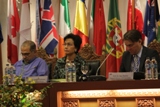Beyond EITI: Timor-Leste a model of transparency

The Díli Convention Centre received delegates from more than 30 countries to participate in a two-day conference, from August 25 to 26, on the Extractive Industries Transparency Initiative (EITI).
This is the first Asia-Pacific Partnership Regional Conference on EITI, entitled "Beyond EITI: Timor-Leste a model of transparency", which the Government of Timor-Leste will show how it’s using the transparency model to ensure sustainable management of natural resource revenues.
The first day of the event, Thursday, was attended by the Minister of Finance Emília Pires, the International EITI Regional Director, Sam Bartlett, the World Bank Director, Sri Mulyani, and the President of the Republic, José Ramos-Horta.
Emília Pires started by speaking on the importance of working together and sharing of experiences that allows to meet objectives and improve the quality of life.
The Minister reminded the nation's, donors’s, civil society’s and the private sector’s commitment with regards to the National Strategic Plan, to state that Timor-Leste must have the ability to turn its resources into a growth engine, to accelerate the economy using the mineral resources.
The Minister of Finance did not want to leave without mentioning that Timor-Leste’s wealth is also in its people because they are the ones who have the knowledge and skills: knowledge which is information and that, through transparent communication, transforms into actions; the ability to have good governance, good performance at work, leading to an even better result.
Emília Pires was proud of the Timor-Leste Transparency Model on the EITI, mentioning that it searches for transparency, seeks to educate and inform, empower and involve, ever more and better, the State, People and companies in the process.
Sam Bartlett began his speech by explaining what the EITI was and characterized it as follows: simple and difficult. Simple because it shows transparency regarding each country’s natural resources although this is the result of hard work, such as that which Timor-Leste has been doing, to show its income and expenses.
Difficult because it represents the collaboration between government, businesses, non-governmental organizations and civil society. The Regional Director of the EITI International Secretariat mentioned the fact that 35 countries have accepted the commitment to present the EITI report and only 19 have done so far. Of the latter, Timor-Leste is one of those who does it , which is why Sam Bartlett congratulates the Government for having been able to show that governments, industry and civil society can work together.
The current World Bank Director and the former Indonesia Minister of Finance, Sri Mulyani, reinforced the reason why the World Bank supports the EITI from the first day: because the principles of transparency and accountability occupy a central role in the World Bank strategy for good governance and anti-corruption.
And, referring to the many natural resources in the Asia-Pacific region, connected them to the importance of transparency and accountability of the EITI, and the work that this entails, regarding the revenues from natural resources in each country.
"For many countries rich in natural resources, oil, gas and minerals are vital to the future of security and well-being of its people. It is therefore extremely important that revenues are used properly and sustainably, so that the people may know where revenue is spent as it is managed. This is called transparency. "
According to Sri Mulyani, this means that civil society can question the government and obtain answers and thus be able to take an active role in the future of their country, believe in theor country and its leaders, which allows them to have hope for the future of their children.
"For me, there is no better illustration of what is meant by the EITI than East Timor, a country that just a decade after independence, has developed a worldwide system of revenue management and achieved the criteria of the EITI compliance. Timor-Leste is the first country in Asia Pacific, and third worldwide, which meets these criteria, "noted the World Bank Director.
The last speech heard in this first day of the conference was from the President of the Republic José Ramos-Horta, who was pleased with the effort shown by Timor-Leste and which has led it to the point of being considered a model of transparency.
He spoke of the perspective of Timor-Leste’s economic development, reiterating that "transparency and good governance are always good in any country," congratulating the Government, specifically the Ministry of Finance, on the announcement of the launch of the Public Procurement Portal, recognizing that it is a string bet in improving the services rendered to the population.










































